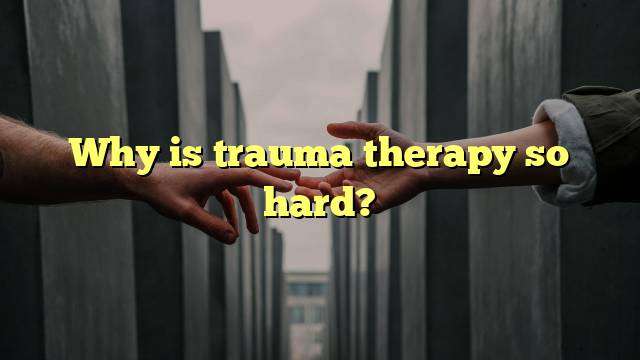Why is Trauma Therapy So Hard?
Traumatic events are often personal and can lead to Post-Traumatic Stress Disorder (PTSD) even when the situation is considered “nothing” by society and others. The wounding is real, and that is why trauma and PTSD are so difficult to treat. While there is a lot of knowledge about what causes trauma, the road to recovery is still a very personal journey.
What is Trauma?
Trauma is a psychological, emotional, and physical response to a stressful event or experience that causes harm or injury. It can be caused by a single event or a series of events and can result in lasting psychological and physiological effects. Trauma is not only caused by physical events or experiences, but can also be caused by emotional, social, and spiritual events or experiences.
Trauma can be present in a variety of forms, from an individual’s own experience to witnessing or hearing about a traumatic event. Trauma can also be created from harsh verbal or emotional abuse, neglect, and various forms of violence. Trauma can also be experienced when faced with a great life change or transition, such as the death of a loved one or the loss of a job.
What is PTSD?
Post-Traumatic Stress Disorder (PTSD) is a mental health condition that can develop when someone has gone through a traumatic event. It can cause anxiety, depression, flashbacks, nightmares, and other symptoms. PTSD often leads to feelings of helplessness and hopelessness, as well as changes in behavior, such as avoidance of certain situations or people.
Symptoms of PTSD can range from mild to severe and can include:
- Intrusive memories – flashbacks, nightmares, or intrusive thoughts about the event.
- Avoidance – avoiding people, places, or activities that remind the person of the event.
- Negative thoughts and feelings – feeling detached from others, feeling emotionally numb, or having difficulty experiencing positive emotions.
- Changes in physical and emotional reactions – feeling easily startled, being overly alert, or having difficulty sleeping.
PTSD can be treated with a variety of therapies, such as cognitive-behavioral therapy (CBT), exposure therapy, and eye movement desensitization and reprocessing (EMDR). These therapies are designed to help people process their traumatic experiences and learn to cope with their symptoms.
Why is Trauma Therapy So Hard?
Trauma therapy can be a difficult process for several reasons. First, it requires the person to confront their traumatic experience. This can be extremely difficult and can bring up a lot of painful emotions and memories. Additionally, the person may be reluctant to talk about the traumatic event, which can make it difficult to make progress in therapy.
Furthermore, trauma therapy can be a long and complex process. It is not a “quick fix” and can take time for the person to process their experience and learn to cope with the symptoms of PTSD. Additionally, the person may experience setbacks and relapses, which can be discouraging.
Finally, trauma therapy can be expensive and may not be covered by insurance. This can be a barrier for many people who need help but cannot afford it.
How Can Trauma Therapy Help?
Despite the challenges, trauma therapy can be an effective tool in treating trauma and PTSD. It can help people process and heal from their traumatic experiences, as well as learn to cope with their symptoms. It can also help the person gain insight into their experience and develop better ways of managing their emotions.
Additionally, trauma therapy can help people develop a sense of safety and security. It can help people feel less alone and more connected to others, as well as understand and accept their experience. Finally, trauma therapy can help people develop better coping skills to manage their symptoms and lead a more fulfilling life.
Conclusion
Trauma therapy is not an easy process, but it can be a valuable tool in helping people heal from traumatic experiences. It can help people process their experience, develop better coping skills, and gain insight into their emotions. With the right support and resources, trauma therapy can be an effective way to treat trauma and PTSD.




